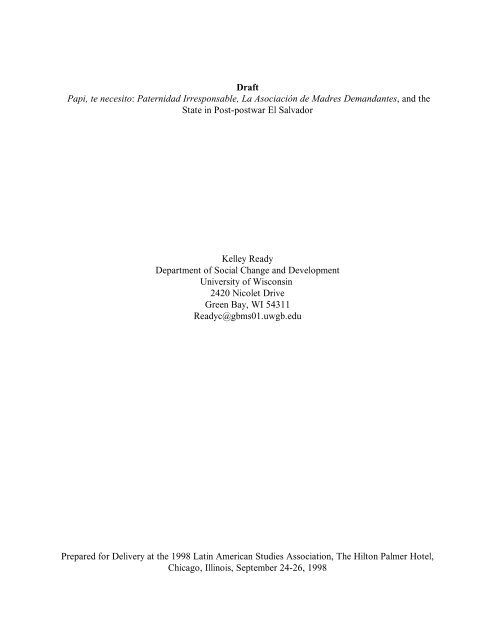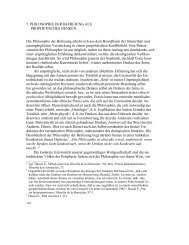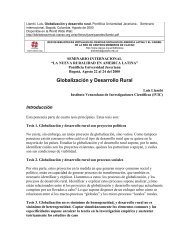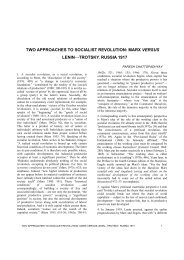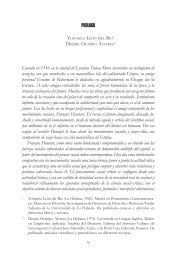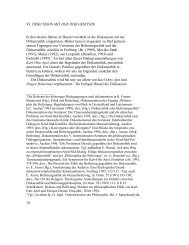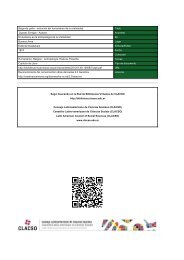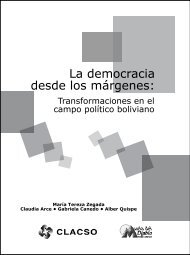Draft Papi, te necesito: Paternidad Irresponsable, La ... - CLACSO
Draft Papi, te necesito: Paternidad Irresponsable, La ... - CLACSO
Draft Papi, te necesito: Paternidad Irresponsable, La ... - CLACSO
You also want an ePaper? Increase the reach of your titles
YUMPU automatically turns print PDFs into web optimized ePapers that Google loves.
<strong>Draft</strong><br />
<strong>Papi</strong>, <strong>te</strong> <strong>necesito</strong>: Pa<strong>te</strong>rnidad <strong>Irresponsable</strong>, <strong>La</strong> Asociación de Madres Demandan<strong>te</strong>s, and the<br />
Sta<strong>te</strong> in Post-postwar El Salvador<br />
Kelley Ready<br />
Department of Social Change and Development<br />
University of Wisconsin<br />
2420 Nicolet Drive<br />
Green Bay, WI 54311<br />
Readyc@gbms01.uwgb.edu<br />
Prepared for Delivery at the 1998 <strong>La</strong>tin American Studies Association, The Hilton Palmer Ho<strong>te</strong>l,<br />
Chicago, Illinois, Sep<strong>te</strong>mber 24-26, 1998
<strong>Papi</strong>, <strong>te</strong> <strong>necesito</strong>: Pa<strong>te</strong>rnidad <strong>Irresponsable</strong>, <strong>La</strong> Asociación de Madres Demandan<strong>te</strong>s,<br />
and the Sta<strong>te</strong> in Post-postwar El Salvador<br />
In January of 1997 outside the chambers of the Salvadoran Legislative Assembly, the<br />
president of that body, Gloria Salguero Gross, one of El Salvador’s largest land owners and a<br />
prominent leader of the right-wing ARENA party, was surrounded by a group of women, several<br />
1<br />
of whom were former FMLN guerrilleras . But it was not a hostile confrontation. Rather they<br />
were patting each other on the back for the success of a “pieza de correspondencia,” a bill that<br />
had been introduced by the leftists and shepherded through Assembly by Diputada Salguero<br />
Gross with the collaboration of diputadas from the FMLN and the Christian Democratic Party,<br />
the PDC.<br />
The bill that brought women from these diverse <strong>te</strong>ndencies together was a proposal that all<br />
candida<strong>te</strong>s for elec<strong>te</strong>d office be required to get a “solvencia,” or a clearance, certifying that they<br />
were not in arrears for child support payments before they could assume their elec<strong>te</strong>d offices.<br />
Developed by the Legislative Initiative of one women’s group, Movimiento de Mujeres“Mélida<br />
Anaya Mon<strong>te</strong>s” or M.A.M., the proposal was publicly lobbied for by women from <strong>La</strong> Asociación<br />
de Madres Demandan<strong>te</strong>s, the Association of Women Seeking Child Support or AMD. In this<br />
paper, I describe the child support sys<strong>te</strong>m in El Salvador and its relation to the sta<strong>te</strong> in order to<br />
explain how the nature of that relationship has brought together women, and men, from the Right<br />
and the Left to challenge pa<strong>te</strong>rnidad irresponsable. I will also examine the philosophy and<br />
conditions that inspired Salvadoran feminists to take on the issue as a key element in their efforts<br />
to reconstruct gender relations.<br />
By 1996, almost five years had passed since the Accords were signed, and both the eli<strong>te</strong>s,<br />
who had previously controlled the sta<strong>te</strong>, and the opposition forces had carried out the <strong>te</strong>rms of the<br />
Accords to the ex<strong>te</strong>nt that reconstruction and reconciliation no longer remained a central focus of<br />
either sector. Rather in post-postwar El Salvador, the modernization of the sta<strong>te</strong> and the economy<br />
has become a prime goal of both the left and the right. According to a book released in 1996 by<br />
an influential new left publisher, “Modernization, direc<strong>te</strong>d at the twenty-first century, is<br />
understood as a major historical change in the form in which Salvadoran society is organized<br />
politically, in how the power of different actors is distribu<strong>te</strong>d and in how those actors will<br />
participa<strong>te</strong>, in how that power will be exercised, and the relationship between the representatives<br />
and represen<strong>te</strong>d in places of power. In addition, [modernization affects] how these relations of<br />
power are expressed in the sta<strong>te</strong>: that is, in how public administration functions in <strong>te</strong>rms of the<br />
2<br />
relations of power.” (Umaña 1996: 71) . The Peace Accords crea<strong>te</strong>d a situation where political<br />
actors who had traditionally been excluded from the administration of the sta<strong>te</strong> have gained<br />
increased access to that power. While the legalization of the FMLN and its offshoots has been an<br />
important aspect of that process, their ability to participa<strong>te</strong> in elections has been only one of the<br />
avenues through which these changes have been occurring. The creation of new sta<strong>te</strong> agencies<br />
1<br />
Research for the paper was funded by a Fulbright grant and a grant from the Institu<strong>te</strong> for<br />
the Study of World Politics.<br />
2This<br />
and all other translations have been done by the author.<br />
2
such as Procuradoría de los Derechos Humanos also opened doors through which previously<br />
excluded actors could participa<strong>te</strong> in the administration of the sta<strong>te</strong>. But most important has been<br />
the ability of organizations that were traditionally aligned with the left, or like the women’s<br />
movement, emerged from the left, to openly organize and mobilize “civil society” to take<br />
advantage of the opportunities and contradictions currently present in Salvadoran sta<strong>te</strong>.<br />
Many of these actors have adop<strong>te</strong>d a new view of modernization and rejec<strong>te</strong>d previously<br />
held beliefs that reduced the sta<strong>te</strong> to an apparatus of control by the bourgeoisie. Rather the sta<strong>te</strong> is<br />
now seen by many in the left as an arena, or arenas, where “the relation of power between<br />
different political forces is ma<strong>te</strong>rialized” (Ibid.: 74). It is with this perspective, combined with a<br />
feminist analysis of women’s condition, that the AMD emerged as a force to organize women<br />
who were using the sta<strong>te</strong> to secure child support from fathers who had abandoned their children.<br />
The faint outline of the words Procuraduría General de los Pobres (Attorney General of<br />
the Poor) can still be made out on the facade of the tall concre<strong>te</strong> building that housed this<br />
institution prior to the 1986 earthquake. The structure has been left standing, unusable, spilled<br />
files still visible from the doorways one walks past to get to the current offices which are housed<br />
in a series crudely construc<strong>te</strong>d wooden buildings, or cabañas provisionales. Established in the<br />
early 1950s during the “modernization” of the sta<strong>te</strong> apparatus which accompanied the policy of<br />
import substitution (Vásquez and Murguialday 1996), the name was upda<strong>te</strong>d in the 1970s to <strong>La</strong><br />
Procuraduría General de la República, or PGR. Its original purpose was to provide some relief<br />
to the misery of the old, the infirm, and to abandoned children. The PGR’s manda<strong>te</strong> expanded in<br />
the eighties when many of the trade unions devo<strong>te</strong>d their activities to the popular movement.<br />
Under the subsequent repression, the PGR became one of the few places that workers could turn<br />
to for help in addressing their complaints about their unpaid salaries, denied benefits and<br />
inadequa<strong>te</strong> working conditions.<br />
However in the most recent phase of “modernization” which was has been made possible<br />
by the signing of the Peace Accords, at<strong>te</strong>nding to la cuota alimenticia, or child support, has<br />
become the major function of the PGR. El Salvador has had a high percentage of female-headed<br />
households. The war not only in<strong>te</strong>nsified the conditions which made this situation problematic<br />
(poverty, de<strong>te</strong>riorating social services, unemployment) but escala<strong>te</strong>d them by breeding an<br />
enormous crop of children whose fathers, soldiers from both sides of the conflict, felt minimal or<br />
no responsibility for their upbringing. During the war, many women felt constrained from<br />
demanding child support. For women on the Left, initiating a demanda meant possible<br />
involvement with the police which was politically risky, and/or putting her ex-compañera in<br />
political jeopardy by giving the police an excuse to detain him. Women who were involved with<br />
political figures or men in the army or the national police feared that they would be the victims of<br />
violence since their companions of<strong>te</strong>n enjoyed impunity from prosecution for far worse crimes.<br />
With the signing of the Peace Accords in 1992 and the emergence of an autonomous<br />
women’s movement, it became more possible for women to poner una demanda, or sue for child<br />
support. The cessation of hostilities lessened the threat of political violence. Women could put in<br />
a demanda without worrying that it would result in the disappearance of their ex-compañero. The<br />
demobilization of the armies on both sides and of the national police began the process of<br />
dismantling a military apparatus whose members had previously been untouchable. Building on a<br />
process that had begun in the la<strong>te</strong> eighties, women in the different <strong>te</strong>ndencies of the FMLN began<br />
3
to reflect upon “the situation and condition” of women in El Salvador and their experience in the<br />
war. With funding from abroad, these organizations, and the women in them, became increasingly<br />
autonomous from the political parties from which they came. They also became increasingly<br />
critical of male domination in their society, in the institutions of the left, and in their personal<br />
relationships.<br />
The Peace Accords also established the conditions in which the “modernization” of the<br />
Salvadoran sta<strong>te</strong> could move forward. Part of this modernization included the enactment, for the<br />
first time in 1994, of a separa<strong>te</strong> legislative code that regula<strong>te</strong>d family life. Until that time, laws<br />
regulating the family had been subsumed in the Civil Code dating from 1860. The new laws<br />
redefined the concept of family and afforded rights to women in and children from uniones de<br />
hecho (common-law marriages). Whereas under the previous law, illegitima<strong>te</strong> children did not<br />
have inheritance rights, the new law recognized all children equally. In addition to revising the<br />
laws governing divorce, the new legislation redefined the point at which women could file a<br />
demanda and expanded the cri<strong>te</strong>ria that would be used to de<strong>te</strong>rmine how much the cuota would<br />
be. Whereas previously women would not receive support until a child was born, demandados<br />
(the men who were being sued) could now be made to contribu<strong>te</strong> to the expenses incurred during<br />
pregnancy and childbirth. In addition, rather than just contributing to the basic costs of feeding<br />
and clothing a child, the cost of the child’s education and health care would be considered in<br />
calculating the amount of the cuota. The revision not only gave women more rights but the<br />
passage of the code resul<strong>te</strong>d in the changes, and those rights, being publicized more widely than<br />
ever before. These changed greatly impac<strong>te</strong>d the work of the PGR and resul<strong>te</strong>d in an increasing<br />
number of women coming to them seeking for child support.<br />
3<br />
According to the records of the PGR , the number of women coming to initia<strong>te</strong> demandas<br />
increased from an average of 2145 in the five years preceeding the signing of the Peace Accords.<br />
In the four years af<strong>te</strong>rwards, that figure jumped to 3751, an increase of 75%.<br />
Setting the Stage to Reconstruct Gender<br />
According to Licenciado Miguel Angel Cardoza Ayala, the Procurador General de la<br />
República, the Attorney General, the PGR’s current constitutional manda<strong>te</strong> calls for it “to watch<br />
over the defense of the family and of persons, and the in<strong>te</strong>rests of minors and others incapable of<br />
4<br />
taking care of themselves.” This function is to be fulfilled by giving legal assistance to persons<br />
who have few resources and representing them in court “in the defense of their individual liberty<br />
and labor rights.” It is a very different role than similar institutions in other countries, I was told<br />
by Procurador. In other places the Attorney General’s office usually represents the sta<strong>te</strong> and<br />
those accused of crimes, he explained. But in El Salvador its function is qui<strong>te</strong> distinct. The<br />
3<br />
One manifestation of the lack of “modernization” in the PGR is the discrepancies between<br />
different source of data. This figure comes from the Libros de Actas for 1987-1996 which are<br />
housed in the PGR archives.<br />
4In<strong>te</strong>rview<br />
done in the office of the Procurador General de la República, San Salvador<br />
January 7, 1997.<br />
4
institution was established to provide legal and social services to those with few resources.<br />
But to the women of the organization, Mujeres por la Dignidad y la Vida, las Dignas, the<br />
PGR is something altogether very different. They see the institution as “the largest stage in the<br />
country where men and women each day face off over the fulfillment of their respective roles in<br />
caring for children” (Vásquez and Murguialday 1996: 13). This is a very li<strong>te</strong>ral description of the<br />
process that women go through in order to solicit the aid of the sta<strong>te</strong> in convincing the fathers of<br />
their children to financially support their offspring. Poor women, mostly those who have had<br />
uniones de hechos, come to the PGR when they decide that they want the fathers of their children<br />
to contribu<strong>te</strong> to their daily main<strong>te</strong>nance. Eventually, if they are even initially successful, they must<br />
meet face to face with the fathers of their children to negotia<strong>te</strong> an amount that he will contribu<strong>te</strong><br />
to their upkeep. But to ex<strong>te</strong>nd the Dignas’ metaphor, if the PGR has crea<strong>te</strong>d the stage for these<br />
negotiations to take place, the AMD has become an unexpec<strong>te</strong>d actor, sometimes welcome,<br />
sometimes not, whose improvisations are rapidly changing the scenery on the stage itself.<br />
For many of the women who come to make a demanda at the PGR, the first s<strong>te</strong>p is to<br />
legally establish the pa<strong>te</strong>rnity of their children. Demandados (those who are the objects of the<br />
demandas) of<strong>te</strong>n initially deny that they are the fathers of their child even when they know it to be<br />
true. In some cases it is possible to document the exis<strong>te</strong>nce of prior relationships to establish<br />
pa<strong>te</strong>rnity. Many of the cases are much more complex, however, such as the ones where women<br />
become pregnant as a result of a rape by their employer. This is a particularly high risk for<br />
domestic workers who are of<strong>te</strong>n young women from the countryside and as a result extremely<br />
vulnerable to the assaults of men in the families where they work. Recognition can be voluntary or<br />
it can be forzoso (forced), secured through a legal procedure in which the woman has to submit<br />
evidence to a judge. Since DNA <strong>te</strong>sting was not even available until recently and still remains out<br />
of reach of the vast majority of women who come to the PGR, the process is of<strong>te</strong>n unsuccessful,<br />
generally prolonged, and almost always extremely painful and humiliating for the women<br />
involved.<br />
When pa<strong>te</strong>rnity is established or if the demandado recognizes his children, the cuota is<br />
established through the Department of Family Relations (DFR) of PGR. The demandan<strong>te</strong> (the one<br />
making the demanda) must present her identification and the birth certifica<strong>te</strong>s of the children. The<br />
DFR worker will send a notice to the workplace or home of the demandado informing him of the<br />
da<strong>te</strong> and time that he must appear for the comparendo (appearance). The appointment can be<br />
anywhere from two to three weeks from the da<strong>te</strong> the woman initia<strong>te</strong>s the process. If the<br />
demandado does not appear for the first appointment, he will be summoned again. Legally, the<br />
5<br />
bachilleres (workers in the DFR) are supposed to send out a warrant if he does not show up<br />
af<strong>te</strong>r the second time he is summoned but according to an investigation by the Dignas, less than<br />
half show up the first time and more than a third appear only af<strong>te</strong>r being called three or more<br />
times (1996: 129). Returning for these appointments represent a significant hardship for women<br />
who have few resources, who must sacrifice earnings to at<strong>te</strong>nd, who are responsible for small<br />
5<br />
The title comes from the fact that originally, one had to have received their bachillerato,<br />
or high school diploma to work in the DRF, and professionals are usually referred to by a title.<br />
Currently the requirement is that they be getting their law degree. Consequently, a number of the<br />
staff is permanently in their last year of law school.<br />
5
children, and/or who must travel into San Salvador from inaccessible areas. If the demandado<br />
does not show up, a warrant for his arrest will be issued but is of<strong>te</strong>n ignored.<br />
If he does appear, the demandan<strong>te</strong> and demandado sit down in the crowded cubicles of<br />
one of the bachilleres who acts as a negotiator. While officially the head of the DFR is supposed<br />
to preside over the comparendos, the case load long ago made that an unrealistic procedure. The<br />
demandan<strong>te</strong> presents the child’s needs while the demandado documents his ability to contribu<strong>te</strong><br />
to the child’s upkeep. If they arrive at a mutually acceptable amount, the cuota is set. When an<br />
agreement cannot be reached and the demandado has a regular salary, the bachiller imposes a<br />
preliminary cuota until more evidence can be provided. If the demandado works in the informal<br />
market or for himself, the Department of Social Work of the PGR is notified and they carry out a<br />
socio-economic study and then impose a cuota.<br />
Once established, the cuota is supposed to be deduc<strong>te</strong>d each month from the demandados’<br />
paycheck by his employers and deposi<strong>te</strong>d directly into the PGR. Women have to come to the<br />
6<br />
Control de Depósitos of the PGR to pick up the cuota . But of<strong>te</strong>n the money does not arrive and<br />
the demandado goes into mora (default). When this happens, women are forced to go back to the<br />
DFR to initia<strong>te</strong> the process of investigating the mora. Many women also of<strong>te</strong>n return to the DFR<br />
when they find that the cuota that was established is inadequa<strong>te</strong> and they must appeal for it to be<br />
increased.<br />
In soliciting a cuota, women are coping directly with what is regarded by most<br />
Salvadorans as a cultural trait of Salvadoran men, la pa<strong>te</strong>rnidad irresponsable, irresponsible<br />
fatherhood. Increasingly recognized as a problem, it is, however, generally seen as an inna<strong>te</strong><br />
component of traditional Salvadoran masculinity or machismo. But the Dignas, as well as other<br />
Salvadoran women’s groups, have rejec<strong>te</strong>d the belief that gender roles are natural. They have<br />
promo<strong>te</strong>d a feminist perspective that reframes machismo as sexism and argues that it suppor<strong>te</strong>d<br />
traditional gender roles that were socially construc<strong>te</strong>d to ensure male power and female<br />
subordination. The issue of pa<strong>te</strong>rnidad irresponsable provided them with a vehicle to directly<br />
challenge these roles. The introduction to their first investigation of the issue sta<strong>te</strong>s that “in the<br />
opinion of the Dignas, the demanda de cuota de alimenticia articula<strong>te</strong>s the practical necessities of<br />
thousands of women with the conception that they, along with the rest of society, have about<br />
motherhood, fatherhood, and the family” (Baires et al. 1996: 8). Through the AMD, the Dignas<br />
built a new organization whose goals were to organize demandan<strong>te</strong>s around these practical<br />
necessities, to “conscienticize” them about their rights as women, and to challenge the cultural<br />
pat<strong>te</strong>rns that encourage pa<strong>te</strong>rnidad irresponsable.<br />
The Dignas’ analysis of the ideological underpinnings of machismo was combined with a<br />
political plan of action that called for the demandan<strong>te</strong>s to “organize themselves not just to resolve<br />
their particular problems but to confront the structural, political, and ideological obstacles”<br />
(Vásquez y Murguialday 1996: 111). They recognized the growing importance of the role that the<br />
sta<strong>te</strong> played in shaping gender and family relations in the period of “democratization” and<br />
“modernization” that El Salvador was going through following the war and the implementation of<br />
the Peace Accords. The response of the sta<strong>te</strong> to pa<strong>te</strong>rnidad irresponsable was insufficient,<br />
6The<br />
PGR has initia<strong>te</strong>d a program where women can get their cuotas direct deposi<strong>te</strong>d into<br />
an account specially set up for that purpose.<br />
6
according to their perspective, simply “translat[ing] the in<strong>te</strong>rests of women (that the fathers<br />
contribu<strong>te</strong> to the sus<strong>te</strong>nance of the children) into a legal issue (the right to receive child support)<br />
and into an administrative issue (the collection of the payment) (1996:16).” The Dignas<br />
understood that the sta<strong>te</strong> had the capacity to use institutions like the PGR to move beyond the<br />
mere treatment of the consequences of pa<strong>te</strong>rnidad irresponsable to adopt policies that could lead<br />
to the restructuring of Salvadoran gender relations. The tactic of organizing demandan<strong>te</strong>s was<br />
in<strong>te</strong>nded, not only reshape women’s conception of gender roles, specifically the rights and<br />
obligations of motherhood and fatherhood, but to pressure the sta<strong>te</strong> to institutional changes that<br />
would actively combat pa<strong>te</strong>rnidad irresponsable.<br />
Motherhood af<strong>te</strong>r the Time of War<br />
The Dignas’ recent focus on organizing women around the issue of cuota alimenticia<br />
points to two factors which have been extremely important in shaping Salvadoran gender roles<br />
and the at<strong>te</strong>mpt to reconstruct those roles in ways that do not oppress women. The first is the<br />
profoundly contradictory institution and ideology of motherhood to which I will return below.<br />
The second is that Salvadoran feminists’ organizing around this institution comes at a time in their<br />
country’s history while the sta<strong>te</strong> is transitioning from an authoritarian regime to one in which new<br />
democratic institutions are being developed with the supposed goal of articulating the will of civil<br />
society.<br />
The Peace Accords that ended the war crea<strong>te</strong>d an opportunity for the incipiently<br />
organized civil society that was unpreceden<strong>te</strong>d in El Salvador’s history. The organizations which<br />
had developed and survived under the extremely adverse conditions of waging guerrilla war<br />
against their government were finally able to work in the open. Suppor<strong>te</strong>d by in<strong>te</strong>rnational<br />
monitoring and increased access to funding, previously clandestine structures of the FMLN, like<br />
the Dignas, were transformed into legitima<strong>te</strong> organizations which could build on the skills they<br />
had developed during the war to mobilized the networks that had sustained them when they were<br />
underground. For those who were not “left behind” by the Peace Accords (and many people<br />
were), they found a renewed sense of purpose that they could and should work to shape the<br />
postwar “democratic” sta<strong>te</strong> to conform to their ideals. Throughout the postwar period, they built<br />
organizations which were orien<strong>te</strong>d at both developing a functioning civil society which advoca<strong>te</strong>d<br />
their ideals and developed mechanisms through which they could get their goals implemen<strong>te</strong>d.<br />
Contrary of the predictions of some New Social Movement theorists, their orientation, as a social<br />
movement, has been very much direc<strong>te</strong>d toward the sta<strong>te</strong>.<br />
The second factor that has shaped this effort is the degree to which motherhood and<br />
women’s position in the family define women’s gender role in El Salvador and do so in an<br />
extremely contradictory way. The Dignas describe motherhood as the cen<strong>te</strong>r of Salvadoran<br />
women’s identity (Baires et al. 1996). Echoing the title of an of<strong>te</strong>n quo<strong>te</strong>d article by the la<strong>te</strong><br />
Martín-Baró, they point to the conflict and ambiguity that surround women’s experience in the<br />
family. Martín-Baró emphasized that despi<strong>te</strong> the fact that the structure of the family incarcera<strong>te</strong>s<br />
women in many ways, it also provides them with a safe harbor. A harbor that is built, in part, he<br />
acknowledged, on “the mythical image of the mother, object of song and poetry” (1990: 272-<br />
273).<br />
7
I will draw upon two very dispara<strong>te</strong> phenomena to illustra<strong>te</strong> the depth and power of the<br />
institution of motherhood in El Salvador. The first is a charac<strong>te</strong>r from Salvadoran legend, <strong>La</strong><br />
Siguanaba. The first version I heard was told to me by an illi<strong>te</strong>ra<strong>te</strong> peasant woman. But it is a<br />
myth known to all Salvadorans and the story is even distribu<strong>te</strong>d in popular “comic-book” form by<br />
venders who sell them in busses and on the streets. Briefly, the story is that <strong>La</strong> Siguanaba was a<br />
very beautiful indian princess who af<strong>te</strong>r she was married was more concerned with looking at her<br />
own image in the river, or going out to dances, depending on which version, than taking care of<br />
her son, el Cipotío. As a result, a god (the god of the wa<strong>te</strong>rs, Tlaloc, in the popular version)<br />
ordered that she be changed into a horrible ugly woman who would live in the river bed, forever<br />
washing clothes, and being forced to see this ugly reflection of herself.<br />
<strong>La</strong> Siguanaba, to this day, is still being si<strong>te</strong>d. Usually she appears to men who are out la<strong>te</strong><br />
at night, drunk, and returning to their homes af<strong>te</strong>r being with a lover. I also was told of an episode<br />
during the war when a military operation was canceled by an FMLN unit af<strong>te</strong>r one of the soldiers<br />
repor<strong>te</strong>d having encoun<strong>te</strong>red <strong>La</strong> Siguanaba. Particularly in the countryside, most people can <strong>te</strong>ll<br />
you the story of someone they know who has met <strong>La</strong> Siguanaba. Thus it is a living legend of the<br />
consequences that women risk in failing to met their ma<strong>te</strong>rnal obligations as well as an<br />
embodiment of the guilt men face when cheating on their wives.<br />
The second manifestation of the power that motherhood holds within Salvadoran culture<br />
that I want to discuss is the CoMadres, the Commit<strong>te</strong>e of Mothers of Political Prisoners, the<br />
Disappeared, and the Assassina<strong>te</strong>d of El Salvador, “Oscar Arnulfo Romero” (S<strong>te</strong>phen 1994).<br />
Insisting that their actions were motiva<strong>te</strong>d by ma<strong>te</strong>rnal instincts rather than political motives, the<br />
CoMadres organized women who had lost children and spouses to publicly challenge the military<br />
and paramilitary forces during the civil war. Incorporating key elements from the ideology of<br />
motherhood, combining it with liberation theology and the discourse of the in<strong>te</strong>rnational human<br />
rights movement, the CoMadres carved out a space for resistance by creating a new set of social<br />
relations. Like the Argentinean Mothers of Plaza de Mayo (Fischer 1989), they took their<br />
demands to the streets denouncing the disappearances, “captures,” and assassinations of the<br />
children and other family members. Their status as self-identified mothers initially provided them<br />
with a measure of safety: the government did not take the actions of such women too seriously.<br />
But as their tactics became more daring, for instance their occupation of the Salvadoran Red<br />
Cross in 1978, the repression against them became more murderous: their offices were bombed,<br />
members were captured and tortured, and, finally, disappeared. Despi<strong>te</strong> the danger, they<br />
continued to work publicly, demonstrating in the streets; occupying foreign embassies, cathedrals,<br />
and government buildings; and reaching out in<strong>te</strong>rnationally for political and ma<strong>te</strong>rial support.<br />
Their exis<strong>te</strong>nce has been seen as part of the broad cultural manifestations which Evelyn<br />
7<br />
The CoMadres was not the only group in El Salvador which advoca<strong>te</strong>d on behalf of this<br />
constituency. CODEFAM, the Support Commit<strong>te</strong>e of Families for Political Prisoners and the<br />
Disappeared, “Marianella Garcia Villas,” and COMAFAC, the Christian Commit<strong>te</strong>e of Mothers<br />
and Families of Prisoners, Disappeared, and Assassina<strong>te</strong>d, “Padre Octavio Ortiz - Hermana<br />
Silvia,” also worked in this area and formed a coalition with the CoMadres in the la<strong>te</strong> 80s but<br />
because they were mixed gender, smaller, and less effective, they were not as clearly identified as<br />
a mothers’ group.<br />
8<br />
7
S<strong>te</strong>vens referred to as “marianismo,” the <strong>La</strong>tin American exaltation of the Virgin Mary. Claiming<br />
that marianismo is the female coun<strong>te</strong>rpart to machismo, S<strong>te</strong>vens describes it as “the cult of<br />
feminine spiritual superiority which <strong>te</strong>aches that women are semi-divine, morally superior, and<br />
spiritually stronger than men” (1973: 91). These qualities supposedly engender in women<br />
“abnegation, that is, an infini<strong>te</strong> capacity for humility and sacrifice. No denial is too great for the<br />
<strong>La</strong>tin American woman. No limit can be divined to her vast store of patience with the cruel men<br />
of her world” (ibid. 94-95). She points out that the representation of this image is ubiquitous:<br />
“The image of the black-clad, mantilla draped figure, kneeling before the altar, rosary in hand,<br />
praying for the soul of sinful menfolk, domina<strong>te</strong>d the <strong>te</strong>levision and cinema screens as well as the<br />
oral tradition of the whole culture area” (ibid: 96).<br />
While such sweeping generalizations ignore the vast diversity in race, class, ethnicity,<br />
experience, and history among “<strong>La</strong>tin American women,” the Dignas identify abnegation and selfsacrifice<br />
as part of the ideology that influences Salvadoran women’s experience of motherhood.<br />
But they do not see it an inevitable part of that experience and their work with the madres<br />
demandan<strong>te</strong>s is direc<strong>te</strong>d at challenging that ideology both as it manifests itself within women’s<br />
consciousness and behavior, and in how it is institutionalized in the apparatus of the sta<strong>te</strong>.<br />
Their analysis of motherhood point to how gender roles within the Salvadoran family are<br />
naturalized. Motherhood plays a central roles in women’s identity, they argue. “To be a wife and,<br />
above all, a mother, that is, to form a family is a dream that is nurtured from when we are little; to<br />
fail to achieve it is the source of pain, anguish, self reproach, and social condemnation. While a<br />
small group of Salvadoran women have questioned this prototype of femininity that limi<strong>te</strong>d a<br />
good part of women capabilities, for the majority of the female population, it continues to be the<br />
ideal that they strive to attain” (Vásquez y Murguialday 1996: 37). But fatherhood has no<br />
corresponding importance in the Salvadoran male identity. While men desire children to establish<br />
their masculinity, for men, fatherhood is a choice; for women, motherhood is seen as an inevitable<br />
and inescapable part of their destiny. For most men, according to their analysis, fatherhood is a<br />
reality that exists only as long as their relationship with their child’s mother continues. Once that<br />
relationship de<strong>te</strong>riora<strong>te</strong>s, so does their commitment, both financial and emotion, to their offspring.<br />
Socially, they point out, there are few sanctions against men who fail to fulfill their obligations to<br />
their children. Men of<strong>te</strong>n deny that they are the fathers of their children and there are few<br />
mechanisms to legally require them to do so. On the other hand, the Dignas acknowledge, women<br />
accept this sta<strong>te</strong> of affairs and rarely do more than try to exert moral pressure on the men to<br />
assume responsibility for their children.<br />
While the Dignas’ analysis situa<strong>te</strong>s motherhood as a central issue in understanding<br />
women’s oppression, they are not using it to explain the origins of women’s subordination as was<br />
done by some feminist theorists in the Uni<strong>te</strong>d Sta<strong>te</strong>s and Europe (Rosaldo 1974, Chodorow<br />
1978). Their analysis mirrors that of Adrienne Rich (1976) who criticized radical feminists such as<br />
Shulamith Firestone (1970) who identified women’s biological responsibility for childbearing as<br />
the source of women’s oppression and called for the implementation of artificial reproduction to<br />
libera<strong>te</strong> women from its yoke. Arguing that Firestone’s view was <strong>te</strong>chnologically de<strong>te</strong>rminant,<br />
Rich distinguished between the institution of motherhood and women’s experience of it. The<br />
lat<strong>te</strong>r, she claimed, was aimed at ensuring that women stay under the control of men while the<br />
former carried the po<strong>te</strong>ntial of much creativity and joy. Rich poin<strong>te</strong>d out that it was not the<br />
9
iological capacity to bear children that de<strong>te</strong>rmined the oppressive nature of the institution; it was<br />
the social conditions, both ma<strong>te</strong>rial and ideological, under which the mothering was carried out.<br />
She called for the dismantling of the patriarchal impositions upon motherhood in order for it to be<br />
viewed as one choice out of many options that should be available to women.<br />
The Dignas’ analysis echoes Rich’s framework and uses those insights to encourage<br />
women to both question gender roles and develop political action base on their roles as mothers,<br />
in particular, as madres demandan<strong>te</strong>s. If motherhood is socially construc<strong>te</strong>d, then it can be<br />
reconstruc<strong>te</strong>d through a feminist praxis of analysis, consciousness-raising, and political action.<br />
Their political program targe<strong>te</strong>d the women whose experience best exemplified the contradictions<br />
between the institution and the experience of motherhood, las madres demandan<strong>te</strong>s. They use a<br />
combination of consciousness raising, group therapy, and feminist political action to organizing<br />
these women. This combination is designed to provide the demandan<strong>te</strong>s with a positive self-image<br />
of themselves which challenges the prevailing image of the cuotas as a handout and asserts that it<br />
is a pa<strong>te</strong>rnal obligation of men to their children. They promo<strong>te</strong> a new ideology of motherhood<br />
which demands “the payment of an adequa<strong>te</strong> level of child support, insists that men recognize<br />
their children as their own and assume responsibility for them, calls on men to share in meeting<br />
the emotional needs of their children, and requires that men assume all the duties and rights that<br />
have been traditionally assigned exclusively to women” (Vásquez y Murguialday 1996: 75).<br />
From Practical In<strong>te</strong>rests to Rights<br />
The Dignas took up the issue of child support af<strong>te</strong>r becoming dissatisfied with their<br />
approach of using “productive” projects (bakeries, raising livestock, opening local stores). The<br />
stra<strong>te</strong>gy behind these projects was based on theories which divided the motives behind women’s<br />
organizing into practical needs and stra<strong>te</strong>gic in<strong>te</strong>rests (Molyneux 1985; Moser 1989). In providing<br />
women a means to an income and legitima<strong>te</strong> excuse to get out of the house and meet with other<br />
women (their practical in<strong>te</strong>rests), their goal was that women would become in<strong>te</strong>res<strong>te</strong>d in the<br />
feminist ideas that the Dignas were promoting (their stra<strong>te</strong>gic in<strong>te</strong>rests). Once they had the<br />
opportunity to reflect upon their own experiences, with the support of women from the Dignas,<br />
they would be motiva<strong>te</strong>d to organize as women and join the organization.<br />
But the stra<strong>te</strong>gy was not working as they had planned. The challenges of making the<br />
projects function overwhelmed the processes of changing women’s consciousness. Despi<strong>te</strong> the<br />
fact that they were successful in channeling some funds into women’s hands (for the most part),<br />
few of the projects became feasible economically. Weighing the large amount of time and money<br />
that was being spent on the projects and the small number of women they were affecting, some<br />
within the Dignas began questioning whether the efforts these types of projects required were<br />
justified (See Mujeres por la Dignidad y la Vida 1993; S<strong>te</strong>phen 1997).<br />
The Dignas could have continued to raise money to keep the projects going, however,<br />
there were several other issues which made the organization, amidst much con<strong>te</strong>ntion, decide to<br />
shift their orientation. The relationships between the poorer rural participants in the productive<br />
projects and the more educa<strong>te</strong>d urban women who formed the core of the Dignas had a set of<br />
dynamics that many of these women had experienced during the war while part of the Resis<strong>te</strong>ncia<br />
Nacional, one of the five political parties of the FMLN. The women in the Dignas increasingly felt<br />
10
that the participants in the projects saw them primarily as a source of funds and felt that they were<br />
falling into asis<strong>te</strong>ncialismo, the practice of giving people things and maintaining their dependency<br />
rather than enabling them to help themselves. In 1992 when the Dignas asser<strong>te</strong>d their autonomy<br />
from the party, they did so, in part, because they rejec<strong>te</strong>d these kinds of relationships. What they<br />
wan<strong>te</strong>d was to find bet<strong>te</strong>r ways to make women “protagonists” and it did not seem to be<br />
happening through the productive projects. Consequently at the annual Dignas’s assembly at<br />
Coa<strong>te</strong>peque in 1993, a proposal was approved to stop developing productive projects and to<br />
focus on organizing women around feminist issues.<br />
At the same time, several of the key activists in the organization, initia<strong>te</strong>d demandas on<br />
behalf of their own children. In the process, they became aware of the large number of women<br />
who were coming to the Procuraduría each day to go through a similar process. Norma Vásquez,<br />
a Mexican feminist who worked with the Dignas, proposed that they do an investigation of the<br />
situation of the demandan<strong>te</strong>s. The issue seemed like a good one, recalled Vilma Vásquez, one of<br />
the founders of both the Dignas and the AMD, because of what she called its “in<strong>te</strong>rlocución” or<br />
in<strong>te</strong>rlocution with the Sta<strong>te</strong>. All the laws used the nuclear family as a model, she explained to me,<br />
when the reality is that the prevalent form of family in El Salvador is a woman with children. The<br />
question for the Dignas was how to reshape the ideal to take that reality into account.<br />
With funding from Spain, the Dignas began to research the issue and to meet with<br />
demandan<strong>te</strong>s to advise them of their rights and to treat their emotional distress which, according<br />
to Vilma, cen<strong>te</strong>red around a variety of problems: incest, powerlessness, motherhood, child abuse,<br />
and bat<strong>te</strong>ring. Soon even the Procuraduría staff began sending difficult cases to the Dignas for<br />
at<strong>te</strong>ntion. By 1994, they were formally providing legal services. Through pressure and<br />
negotiation, they succeeded in resolving numerous difficult cases that had been stalled in the<br />
Procuraduría.<br />
But the work soon went beyond dealing with individual cases. As part of the Peace<br />
Accords, the National Police and several branches of the armed forces were dissolved. In<br />
November of 1994, those that were laid off were given severance pay. Coming only a few months<br />
af<strong>te</strong>r the AMD had begun to organize, they were able to pressure the Procurador so that he<br />
announced that they would deduct the equivalent of twelve months of cuotas from the severance<br />
pay of those who were demandados. Unfortuna<strong>te</strong>ly, despi<strong>te</strong> this change in policy, the mechanisms<br />
to implement it were not established in time and many women discovered that the severance pay<br />
had already been dispersed by the time they arrived to claim their portion. Other women failed to<br />
even put in claims because of threats from their ex-partners who had been in the police or military.<br />
Despi<strong>te</strong> the lack of success, the campaign moun<strong>te</strong>d by the Association attrac<strong>te</strong>d more women into<br />
the AMD and raised awareness of the problem of pa<strong>te</strong>rnidad irresponsable. The efficacy of their<br />
work was recognized by UNICEF who awarded the Dignas’ their first annual communication<br />
award in 1994 for their work in generating publicity around the issue of cuotas alimenticias<br />
Af<strong>te</strong>r an initial unsuccessful at<strong>te</strong>mpt to organized a group around the issue of violence in<br />
1995, they star<strong>te</strong>d a “grupo de a<strong>te</strong>nción organizativa,” a group in which the women would be not<br />
just be trea<strong>te</strong>d but would be organized. This developed into an initiative which went beyond the<br />
Dignas goal of “analyzing, pushing forward, and supporting the collective action” of the<br />
demandan<strong>te</strong>s to one which actually “brought the demandan<strong>te</strong>s together as a group which would<br />
express their political in<strong>te</strong>rests” (Vázquez y Murguialday 1996: 79). With funds from the<br />
11
European Union and Canada, the office of the Asociación de Madres Demandan<strong>te</strong>s, separa<strong>te</strong><br />
from the Dignas, opened in 1995 around the corner from the Procuraduría.<br />
By Sep<strong>te</strong>mber of 1995, when President Cristiani offer voluntary retirement to employees<br />
in the public sector as part of his privatization of the sta<strong>te</strong>, the AMD was prepared. They held a<br />
news conference criticizing the fact that deductions for the cuotas were not considered as part of<br />
the plan. The Procuraduría sent a proposal to the Legislative Assembly two days la<strong>te</strong>r which was<br />
rewrit<strong>te</strong>n as Decree 568. The law required that 30% of the severance pay be deduc<strong>te</strong>d and handed<br />
over to the demandan<strong>te</strong>s. The AMD worked actively to lobby for the passage of the bill. They<br />
also fought to include a provision that would require that the Procuraduría of Human Rights, an<br />
institution set up by the Peace Accords, be required to verify that women whose demandado was<br />
going retire be notified in time to guaran<strong>te</strong>e that they could access the funds. While this<br />
amendment was not included, Decree 568 was passed quickly enough that women had time to<br />
claim their cuotas.<br />
In addition to the passage of the bill with which I began this paper, in 1996, the AMD<br />
were also able to convince the Procurador to propose a decree that would allow the PGR to take<br />
a cuota deduction from workers’ yearly bonus known as the guinaldo. Workers with a formal<br />
salary are awarded an extra month’s pay in December each year, os<strong>te</strong>nsibly to cover the additional<br />
expenses of Christmas and New Years. But these funds had never been considered as part of the<br />
total income in de<strong>te</strong>rmining the cuota until the passage of this legislation. This bill, in particular,<br />
vividly illustra<strong>te</strong>s how the AMD’s efforts at reshaping gender relations are in<strong>te</strong>rsecting with global<br />
policies and sta<strong>te</strong> formation in post- postwar El Salvador.<br />
The structural adjustment policies of the World Bank have made it impossible for El<br />
Salvador to increase its budget for social services. While the Legislature would have never<br />
approved an across the board increase in the cuotas women receive, they did accept the<br />
Procurador’s proposal for a portion of the guinaldo to be deduc<strong>te</strong>d for child support. According<br />
to Procurador, this legislation was one of the principal achievements of the PGR in 1996 and he<br />
acknowledged that the initiative came from the AMD.<br />
The momentum that the AMD had gathered continued with the passage of the<br />
requirement that candida<strong>te</strong>s obtain a solvencia before taking their seats. But the proceedings<br />
illustra<strong>te</strong>d the contradictory con<strong>te</strong>xt in which the AMD has had to opera<strong>te</strong>. During the session<br />
that the bill was to be considered, the first piece of correspondence read was from the PDC<br />
Diputada, Rosa Mélida Villatoro from Morazan. She was the head of the Assembly’s commission<br />
on the family (she was defea<strong>te</strong>d in the elections of 1997). While her ma<strong>te</strong>rnalist concerns about<br />
poor women and their children have made her one of the AMD’s primary conduits in the<br />
Legislature, she is virulently anti-abortion and had submit<strong>te</strong>d this sta<strong>te</strong>ment to the Assembly which<br />
8<br />
called on them to elimina<strong>te</strong> the cases under which abortion was permit<strong>te</strong>d. The Assembly<br />
immedia<strong>te</strong>ly passed on to the correspondence of the AMD.<br />
Lorena Peña, an FMLN diputada and the president of M.A.M., introduced the proposal<br />
8<br />
While this seemed just polemic at the time, few months la<strong>te</strong>r a new penal code was passed<br />
which made abortion, which had been legal in some cases, comple<strong>te</strong>ly illegal. It was a move that<br />
took the Salvadoran women’s movement by surprise and one which they were totally unprepared<br />
to defeat.<br />
12
with the argument that supporting one’s children was “a moral element that every legislator, male<br />
and female, should have.” Representatives of party af<strong>te</strong>r party got up to support the proposal to<br />
the cheers of a contingent from the AMD which sat in the gallery. Even ARENA, who the AMD<br />
had identified as having at least two candida<strong>te</strong>s in default, suppor<strong>te</strong>d the proposal. Despi<strong>te</strong> the<br />
outpouring of support, the legislators began a deba<strong>te</strong> about whether to vo<strong>te</strong> for the proposal as it<br />
stood or send it to commit<strong>te</strong>e for review. One of the diputados on the stage, Gustavo Salinas of<br />
the PDC, called for a direct vo<strong>te</strong> but Lorena Peña opposed it and argued for it to be revised in<br />
commit<strong>te</strong>e. The women from the AMD were sea<strong>te</strong>d behind Mélida Villatoro. She turned to<br />
consult with Vilma and Nely, two of the staff. Peña, who was sea<strong>te</strong>d below, came up to explain<br />
her concern that if it did not go to commit<strong>te</strong>e, it would include loopholes or be writ<strong>te</strong>n in a way<br />
that it would be declared unconstitutional. Salgero Gross sugges<strong>te</strong>d that she call a recess and the<br />
legislative commission could meet for twenty minu<strong>te</strong>s to see if they could come up with a<br />
proposal or if there was the need for more consideration. They came back saying that they needed<br />
more time but it was agreed that wha<strong>te</strong>ver they came up with would be approved without<br />
additional amendments. The agreement was unanimous and its passage was front page news the<br />
next day.<br />
While the AMD knew that there were candida<strong>te</strong>s from both the FMLN and ARENA who<br />
were in default, they did not anticipa<strong>te</strong> that the head of the ARENA youth, Wal<strong>te</strong>r Araujo, would<br />
owe 30,000 colones to his ex-wife. Araujo was the picture boy of the party. Young, handsome,<br />
and extremely articula<strong>te</strong>, he had been prominently featured in campaign ads on <strong>te</strong>levision<br />
criticizing the FMLN as <strong>te</strong>rrorist. News of his default genera<strong>te</strong>d enormous publicity and calls for<br />
his resignation from the party. While he denied that he had failed to support his son, claimed that<br />
it was a misrepresentation, and criticized his detractors for saying things that hurt his child, he<br />
also paid the debt and received his clearance.<br />
Both of these initiatives demonstra<strong>te</strong> the political sophistication of the AMD. They had<br />
developed working relationships with the Procurador and elabora<strong>te</strong>d a proposal that enabled him<br />
to expand his budget without violating the neoliberal policies of the sta<strong>te</strong>. In addition, they had<br />
formula<strong>te</strong>d proposals whose premises were hard to challenge. It was hard to argue that children<br />
should not get a portion of what their fathers receive for Christmas. It was equally impossible for<br />
any of the diputados to argue that someone who was behind on child support payments should be<br />
allowed to take office. The proposal and notoriety in Araujo’s case genera<strong>te</strong>d significant<br />
additional publicity around the issue.<br />
But it is the particular role of the sta<strong>te</strong> as arbitrator between men and women and their<br />
children that makes it possible for women like Salguero Gross and Villatoro to jump on the<br />
pa<strong>te</strong>rnidad responsable bandwagon. Rather than providing the funds, the sta<strong>te</strong> simply collects<br />
9<br />
them from the fathers or their employers and redistribu<strong>te</strong>s the funds the mothers . While the sta<strong>te</strong><br />
must support the institution of the PGR, it has not assumed any responsibility for paying for the<br />
main<strong>te</strong>nance of children except those placed in orphanages. The AMD has not challenged this<br />
structure and sees it as futile to do so. This structure crea<strong>te</strong>s the condition where Salvadoran<br />
feminists with a radical critical of Neoliberalism find themselves on the same side of women from<br />
9Though<br />
there were rumored cases of women who had been demandado, no one in the<br />
Procuraduría was aware of any actual cases.<br />
13
the Right who not only support a neoliberal agenda but oppose abortion rights.<br />
Works Ci<strong>te</strong>d<br />
Baires, Sonia, Dilcia Marroquin, Clara Murguialday, Ruth Polanco y Norma Vázquez (1996)<br />
Mami, mami, demanda la cuota . . .la necesitamos: Un análisis feminista sobre la demanda de<br />
cuota alimenticia a la Procuraduría. San Salvador: Mujeres por la Dignidad y la Vida.<br />
Castro de Pinzon, Emma (1989) Informe Final Sobre "Situación de la Mujere Campesina Fren<strong>te</strong> a<br />
la Legislación." San Salvador: Organización de las Nacciónes Unidas para la Agricultura y la<br />
Alimentación.<br />
Chodorow, Nancy (1978) The Reproduction of Mothering. Berkeley: University of California<br />
Press.<br />
Fisher, Jo (1989) Mothers of the Disappeared. Boston: South End Press.<br />
Firestone, Shulamith (1970) The Dialectic of Sex. London: The Women’s Press.<br />
Molyneux, Maxine (1985) “Mobilization without emancipation? Women’s in<strong>te</strong>rests, the sta<strong>te</strong>, and<br />
revolution in Nicaragua.” Feminist Studies Vol. 11, No. 2: 227-54.<br />
Moser, Caroline O. (1989) “Gender Planning in the Third World: Meeting Practical and Stra<strong>te</strong>gic<br />
Gender Needs” World Development Vol. 17, No. 11: 1799-1825.<br />
Mujeres por la Dignidad y la Vida (1993) Los Proyectos Productivos y la Autonomia Economica<br />
de las Mujeres: <strong>La</strong> experiencia de MUJERES POR LA DIGNIDAD Y LA VIDA en el desarrollo<br />
de proyectos con y para las mujeres. San Salvador: <strong>La</strong>s Dignas.<br />
Rosaldo, Michelle Zimbalist (1974) "Women, Culture, and Society: A Theoretical Overview." In<br />
Women, Culture, and Society. Edi<strong>te</strong>d by Rosaldo, Michelle Zimbalist and Louise <strong>La</strong>mphere.<br />
Stanford, CA: Stanford University Press.<br />
Rich, Adrienne (1976) Of Woman Born. New York: Norton.<br />
S<strong>te</strong>phen, Lynn, ed. (1994) Hear My Testimony, Maria Teresa Tula, Human Rights Activist in El<br />
Salvador. Boston: South End Press.<br />
(1997) Women and Social Movements in <strong>La</strong>tin America: Power from Below<br />
Aus<strong>te</strong>n: University of Texas Press.<br />
S<strong>te</strong>phens, Evelyn P. (1973) “Marianismo: The other face of machismo in <strong>La</strong>tin America.” In<br />
Male and Female in <strong>La</strong>tin America. Edi<strong>te</strong>d by Pesca<strong>te</strong>llo, Ann. Pittsburgh: University of<br />
Pittsburgh Press.<br />
Umaña, Carlos (1996) Un nuevo mapa para El Salvador. San Salvador: ediciones <strong>te</strong>ndencias.<br />
14
Vásquez, Norma and Clara Murguialday (1996) Unas + Otras x Todas = Associación de Madres<br />
Demandan<strong>te</strong>s: Una lucha colectiva por la cuota justa y la pa<strong>te</strong>rnidad responsable. San Salvador:<br />
<strong>La</strong>s Dignas.<br />
15


